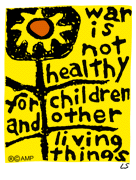Solutions to Africa's Food Woes Remain Elusive
The following is the report NPR correspondent Jason Beaubien filed on Tuesday about extreme poverty in Africa. What's amazing to me is how little advancement has been made revolving around farming in Africa. I mean, I'm all for a simpler way of life, but these people are starving because no one has taught them about irrigation and crop rotation - things I was introduced to, briefly, in a social studies class when I was probably 12.
How can this be happening in 2006?
Morning Edition, October 10, 2006 - Sub-Saharan Africa is waiting for a Green revolution. Agricultural movements in Asia and Latin America in the later part of the 20th century dramatically boosted crop yields, allowed countries to feed growing populations and spurred economic growth.
But sub-Saharan Africa still doesn't produce enough food to feed its own people. Millions of Africans are chronically malnourished, and the region has become perennially dependent on international food aid.
The majority of Africans earn their livings through agriculture, most as subsistence farmers. And African soil is some of the least productive in the world.
In Western Tanzania, herders graze small Zebu cattle. The herds of stocky, almost-miniature cows migrate across the plains of the Rift Valley. The animals can survive in what is at times a harsh, semi-arid environment, but they don't produce nearly as much milk or beef as Western breeds.
Sedentary farmers in the area grow mainly sorghum and maize. Corn production, however, is erratic. Some of the small plots have rows of tall, sturdy corn plants. Others are dusty expanses of failed crops.
Amelio Nande says he gets less and less food each year from his five-acre field. He says the land has become less productive mainly because of drought.
Nande grows corn and a little bit of rice. He says he keeps most of his crop to feed his family. He sells a portion of his harvest at the local market. This is his only source of cash. So the drop in productivity of his land directly affects his family's income. But he says there's little he can do about it.
If you put fertilizer here, he says, it will burn the plants. He also doesn't rotate his crops. There's no irrigation. And Nande believes the amount he harvests is entirely dependent on rainfall.
In much of sub-Saharan Africa, most subsistence-farmers operate this way. They use simple techniques that haven't changed for generations.
As nutrients get leeched from the soils and Africa's population grows, the gap between the amount of food produced and the amount needed grows wider.
Mark Rosegrant with the International Food Policy Research Institute says a solution to Africa's overall food problems is still a long way off.
"When we look at long-term projections in Africa, there's still going to be a period where imports are going to be increasing substantially," he says. "So they're going to be relying on increased market imports. But also I think inevitably there's going to be still a considerable need for concessionary- and food aid-type imports of food."
And Rosegrant says unless there are significant policy shifts, the need for food aid and the number of malnourished Africans will increase in the coming decades.


















0 Comments:
Post a Comment
<< Home